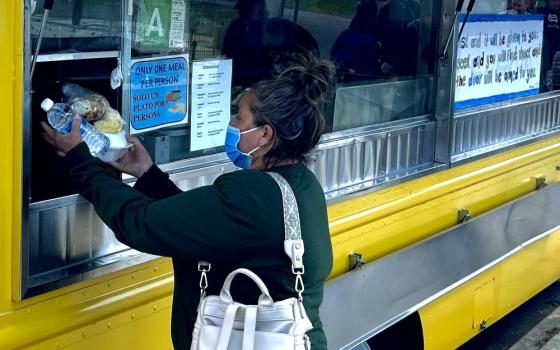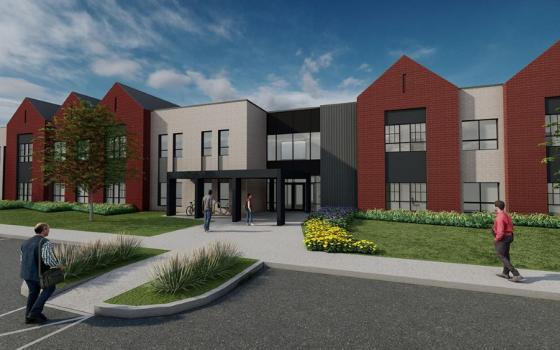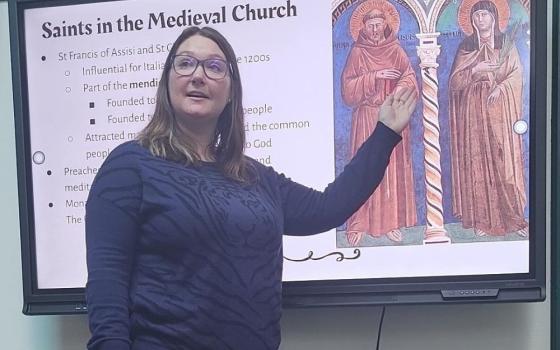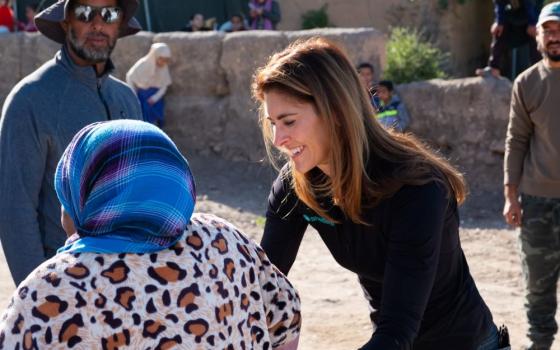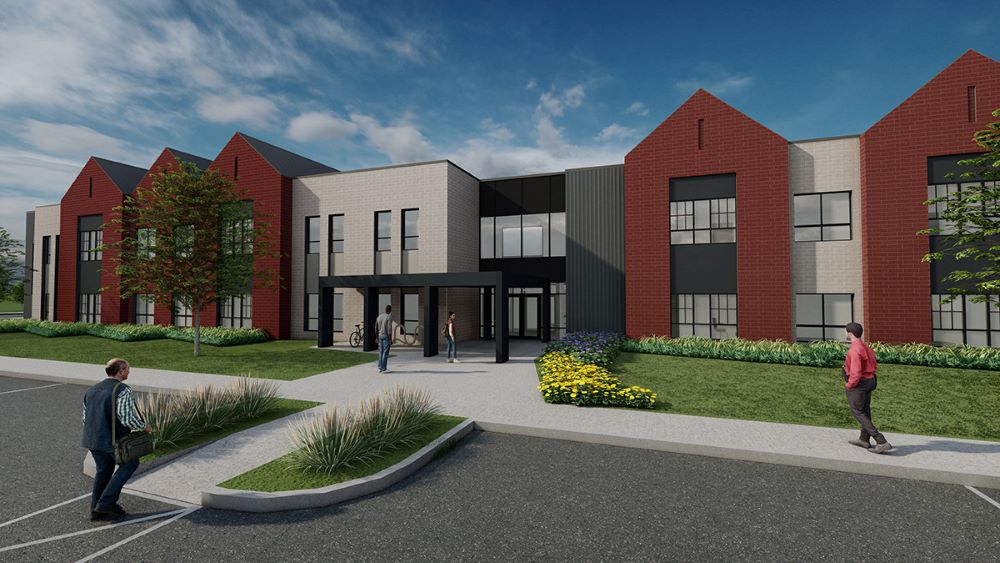
This is an architect's rendering of the resident entry for the Bridge Housing Campus in Detroit, scheduled to open in May. It features 40 studio apartments, a group dining room, classrooms, barbershop, dental and medical clinics, gym and a nondenominational chapel. (Courtesy of Pope Francis Center)
Forty studio apartments, a group dining room, classrooms, a barbershop, dental and medical clinics, a gym donated by former Detroit Pistons basketball star Vinnie Johnson, a nondenominational chapel, and even a bicycle repair shop.
All this and more will soon welcome Detroit's "hardest to house" people at the city's Bridge Housing Campus. Scheduled to open in May, it is a 60,000 square-foot facility with six interconnected buildings, and is being built on 6 acres in the Core City neighborhood. This transitional housing facility was planned years ago by the Pope Francis Center, a recently renamed 30-year-old ministry to homeless people founded at Sts. Peter and Paul, a Jesuit parish downtown near Detroit's Renaissance Center.
The center envisions residents staying at the new facility as long as three to four months before transitioning to more permanent housing.
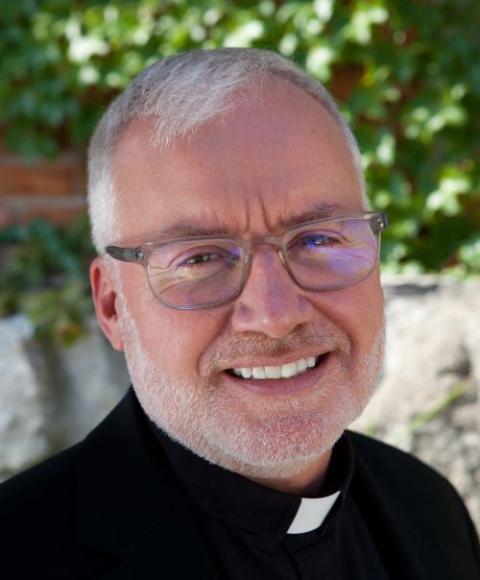
Jesuit Fr. Tim McCabe is president and CEO of the Bridge Housing Campus in Detroit. (Courtesy of Pope Francis Center)
The opening of the facility is the realization of a long-held dream of Jesuit Fr. Tim McCabe, the center's president and CEO.
"My heart was already there with folks who were marginalized or folks who were dealing with different kinds of illness," he told NCR. "I loved a culture of giving respect and nonjudgmental support for homeless people. This honors their human dignity."
McCabe, who grew up in Ferndale, a Detroit suburb, had a late calling to the priesthood and was ordained in 2015. One of his first assignments as a priest was at Sts. Peter and Paul, and that brought him face-to-face with many of the city's homeless people.
For years, this parish had been offering daytime help to hungry and homeless people through its Warming Center. McCabe eventually suggested the parish rename the Warming Center because that didn't describe everything it offered. It was renamed the Pope Francis Center and established as a nonprofit.
The Bridge Housing Campus is scheduled to open in May in Detroit's Core City neighborhood. The transitional housing facility is a project of the Pope Francis Center, a ministry to homeless people founded at Sts. Peter and Paul Parish in Detroit. (Courtesy of Pope Francis Center)
The center had historically offered access to showers, hot meals and washing machines. Those services will continue as the new Bridge Campus opens.
Even years ago, McCabe and others could see that many homeless people needed much more than a drop-in center for a meal or shower.
"We were certainly keeping people alive, helping and supporting them. But there was nothing that was really changing their situations," McCabe said.
So, with Jesuit encouragement in 2016, he visited 10 American cities to study 25 approaches to homelessness. McCabe wanted to see and study the most effective programs — what really worked best for homeless people.
Advertisement
"There was a place in San Antonio," he recalled, "that I really liked. It was called Haven for Hope. All the services that homeless people might need were right there — from government offices to detox clinics. They were all on one campus. I also saw things in some programs that I would never do — like housing too many people in one space. An optimal number is about 40. You want to have a sense of community for the homeless."
McCabe also learned during his investigative tour that homeless people challenged with mental illness are often intimidated by high-rise buildings. He decided that when Detroit's housing structure was finally built, it wouldn't have any buildings taller than two stories. At this new space, he particularly hoped to welcome Detroit's "chronically homeless."
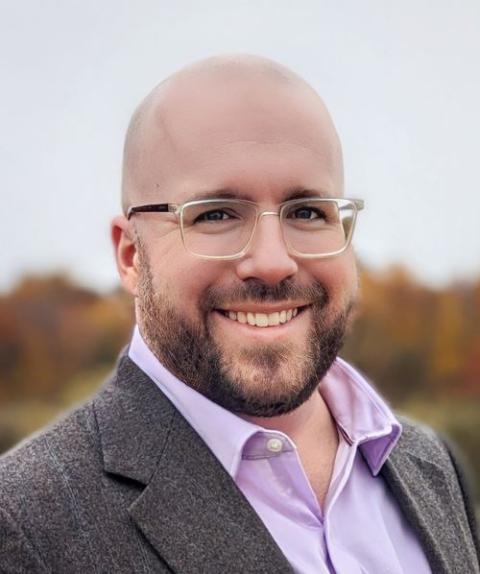
William Kangas is executive director of the Pope Francis Center in Detroit. (Courtesy of Pope Francis Center)
William Kangas, the center's executive director, told NCR said that people who have experienced chronic homelessness often "have had a deeper level of complexity and trauma in their lives."
"There needs to be a deeper level of care and healing in these lives," Kangas said. That's the reason, he said, for a "bridge" facility like the one being built on West Hancock Street. It will offer more time and help to chronically homeless people. Architects have even included an outdoor urban living space for people who are too traumatized to live indoors. This space has heated sidewalks and overhead heaters.
For months, McCabe has been proudly donning a hard hat to lead large and small tours around the Bridge Housing Campus as foundations were poured, buildings framed and a handsome brick and steel structure with large windows took shape.
McCabe said that it had been difficult to raise money for the initiative during the COVID-19 pandemic.
Detroit's own United Auto Workers union and Ford Motor Company had already contributed generously. But, construction cost estimates were going up, and $14 million was needed to keep the project moving. Out of nowhere, McCabe said he got a phone call from the Julia Burke Foundation, a California family foundation established in memory of their daughter, Julia, who had been killed in a car accident at 16.
At the end of the call, he recalled, the foundation's representative asked, "How about if we give you $7 million?" A few years later, the group gave another $6 million to help complete the Bridge Housing Campus.
Jesuit Fr. Tim McCabe talks with a visitor to the Pope Francis Center in Detroit. The center will open its Bridge Housing Campus in May. Residents are expected to stay at the new facility as long as three to four months before transitioning to more permanent housing. (Courtesy of Pope Francis Center)
With the expected opening of the campus just a few months away, McCabe is quick to say that many "miracles" that have kept this ministry alive have come through people — those who work at the Pope Francis Center, or through volunteers. The diversity of his center's staff, he believes, is one of those great gifts.
"I have Catholics, Protestants and also agnostics with a passion for this ministry," he said. "I also have people who are in recovery from substance abuse or were incarcerated. All of those human experiences have led to an empathy and compassion in them for our approach to those who experience homelessness."
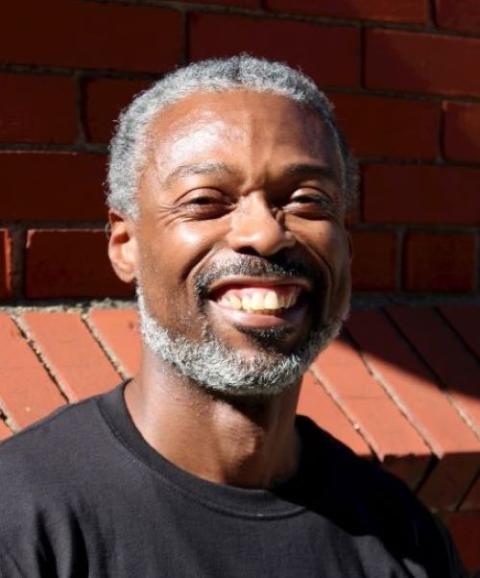
Jamil Allen is program manager at the Bridge Housing Campus in Detroit. (Courtesy of Pope Francis Center)
Jamil Allen, for instance, the center's program manager, guides homeless people toward helping agencies, therapists or educational programs. In a 2023 YouTube post for Safe and Just Michigan, Allen frankly shared the dramatic and tragic story of his impoverished childhood, family violence and eventual involvement in a gang on the lower East side of Detroit.
Allen spent 33 years in prison after being convicted of murder at 17 in 1987. But, as he said in his YouTube video, the mentoring he received from another young prisoner changed him profoundly. It gave him something new to live for. So, he educated himself in prison and was released in 2018.
"Now, I'm a companion, mentor and servant for others. I believe that my purpose here on this earth is to serve and make life better for the next generation to come. I do that," he said in the last sentence of his testimonial, "at the Pope Francis Center."
[This article was made possible by a grant from the Hilton Foundation.]





